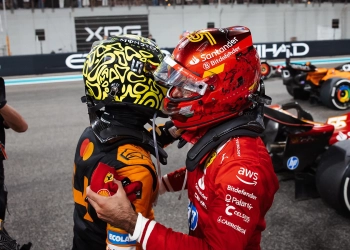Organisers at the Hockenheim circuit have said they would welcome the return of Formula 1 – but only at a sensible price that won’t cripple its finances.
Although the Nurburgring circuit hosted a stand-alone round under the title of the Eifel Grand Prix during a Covid-impacted 2020, the German Grand Prix has been absent from the F1 calendar since 2019 – a chaotic wet-to-dry race that was subsequently voted the race of the year in an online poll.
With Germany previously having hosted two races a year at the height of Michael Schumacher’s dominance, from 2007 onwards the decision was made to interchange a single race in the country between Hockenheim and the Nurburgring.
But with the Nurburgring’s remote location proving a sticking point for attracting fans and the circuit also in dire straits financially, Hockenheim carried on as the sole venue for the German GP beyond 2014, hosting a race every other year up to the 2018 running.
Financial issues have been behind its continued absence ever since, with its surprise inclusion on the 2019 calendar funded by Mercedes stepping in as the event’s title sponsor.
However, key figures involved in the 4.7-kilometre Hockenheimring venue are angling for a potential F1 return.
“We very much want Formula 1 to come back to Germany,” the Hockenheimring’s circuit director Jorn Teske told the German broadcaster Sport1.
“We know how important the premier class is for a circuit, but also for the region around it. We owe our global fame to the sport and are really doing everything we can to come back.”
Despite his eagerness for the sport to return to Germany on a permanent basis, Teske has warned that any return must not destroy the circuit financially.
The German has suggested that a return to the rotation schedule it shared with the Nurburgring between 2007-14 would be a viable solution to the problem.
“Formula 1 must not ruin us,” he declared. “So we have to find a way to get back together.
“We don’t have to make a profit, but we can’t make a loss either. One possible solution to ease the financial burden would be a collaboration with another circuit.
“We are definitely open to organising a race once every two years. If there were a rotation with, say, the Nürburgring, that would be great for the German fans, but also for myself.”
Germany’s sustained absence from the calendar has not been aided by the decline in the representation of its drivers on the F1 grid in recent years.
In 2010 seven of the 24-driver field was made up of German participants – including seven-time World Champion Schumacher, along with future title winners Sebastian Vettel and Nico Rosberg.

Despite Nico Hulkenberg returning after three years away, Vettel’s retirement and Mick Schumacher’s axe from Haas at the end of last season means there is only one German representative on the 2023 grid.
Even Mercedes’ record-breaking success between 2014-21 was unable to inspire an increase in attendance figures and fanfare at the races like the Red Bull Ring in Austria has experienced over the last decade.
Audi’s eagerly anticipated venture into F1, however, could gradually inspire an upturn in support for the sport in the country again.
The Volkswagen-owned brand has agreed to a deal to take a majority share in the Sauber Group and will enter as a full-time outfit and engine manufacturer when the technical regulations are overhauled in 2026.
Audi has previously stated its desire to field a German driver in its line-up – although it has since backtracked on that by denying it would be an necessity.









